As an eCommerce store owner, developing a customer engagement strategy is key to driving sales and building a loyal customer base. While making a sale is important, post-sales engagement is equally important to the success of your business. By continuing the conversation with your customers after they’ve made a purchase, you can create a positive customer experience, encourage repeat business, and even generate new leads through positive word-of-mouth.
But how do you develop a winning customer engagement strategy? We’ve got that covered.
To help you develop effective customer engagement ideas and strategies, we’ve compiled 7 proven techniques to engage with your customers post-sales. So, whether you want to improve customer satisfaction, increase sales, or build brand awareness, these post-sales engagement techniques will help you achieve your goals.
Sign up for Retainful to implement powerful customer engagement methods and grow your business.
What is customer engagement strategy?
A customer engagement strategy is a marketing plan that focuses on building strong relationships with your customers. It’s all about interacting with your customers in a way that creates a meaningful connection and keeps them coming back for more.
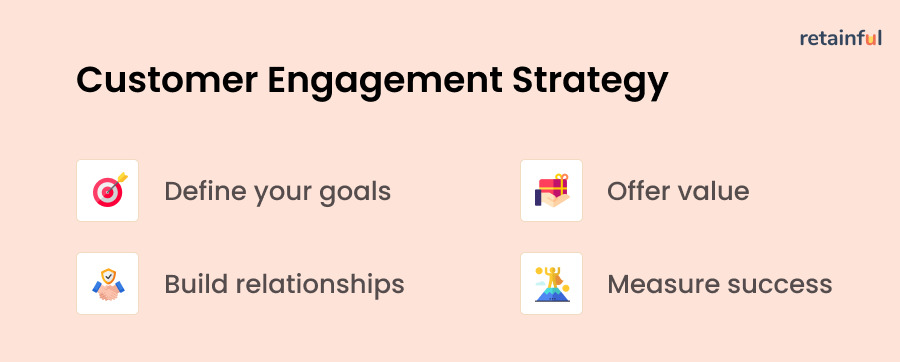
But why are customer engagement ideas and strategies important for your business? Well, the answer is simple – it can increase customer retention and ultimately drive sales.
Benefits of customer engagement post sales
As an eCommerce store owner, your focus should be on making your customers happy by making them feel special. According to studies, customers who are engaged with your store generate 23% more revenue than person who feels less connected to their store. Engaging with customers can help you build and maintain a large customer base by connecting and engaging actively with them.
The following are some of the benefits of customer engagement post-sales.
- Builds customer loyalty:
- Boosts sales:
- Insights for improvement:
- Increased brand awareness:
- Increases customer satisfaction,
- Reduces customer retention
- Opportunities for upselling
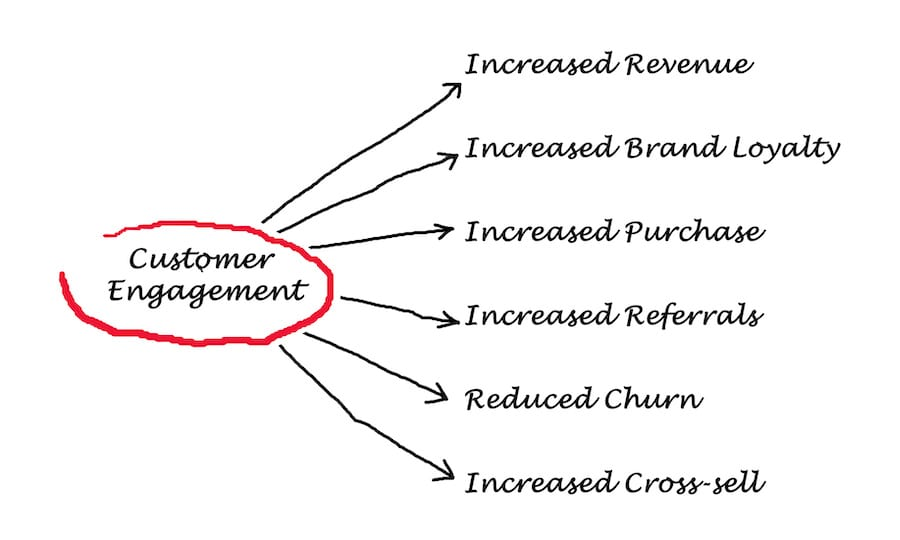
Types of customer engagement
Customer engagement strategy is vital for the growth of your business. These strategies can help you connect with your customers in a unique way and build brand awareness. The question is, which ones are right for your business? It’s important to experiment and find the strategies that work best for your audience.
So, get creative and don’t be afraid to try new things. After all, a successful customer engagement maketing strategy can make all the difference for your eCommerce business.
Onboarding engagement
Onboarding engagement is the process of guiding your customers through their first experience with your brand, It’s important to create a positive first impression, and a smooth and enjoyable onboarding experience can help to achieve this.
Active engagement
If you don’t know where to start with customer engagement, start with active engagement. This involves scanning for feedback that is shared on websites, sent through email or posted on social media channels. By responding to customer’s queries and concerns on social media, companies can significantly decrease their customer churn rate.
Social Engagement
The process of social engagement revolves around establishing a connection with customers through actions such as acknowledging their feedback, providing answers to their queries, and resolving their issues. It’s all about creating content that resonates with them and encourages interaction. Try running polls or quizzes on your social media channels to get your customers involved or sharing user-generated content like customer reviews or photos of your products in use.
Collaborative engagement
Collaborative engagement involves working together with customers to understand their needs, preferences, and expectations and then using this information to co-create solutions that meet those needs. This not only increases sales but helps retain customers.
Customer engagement strategies
Customer engagement strategies are what sets successful online businesses apart. But how can you implement a customer engagement marketing strategy in your eCommerce store?
Implementing customer engagement methods will make your customers feel special and cared for. This would ultimately drive more sales and help you retain customers.
Customer loyalty programs
Did you know that the average order value of customers enrolled in loyalty programs is 12% higher than other customers?
Customer loyalty programs are a powerful customer engagement marketing technique that can help retain existing customers and attract new ones. It is an initiative to encourage customers to continue purchasing their products or services.
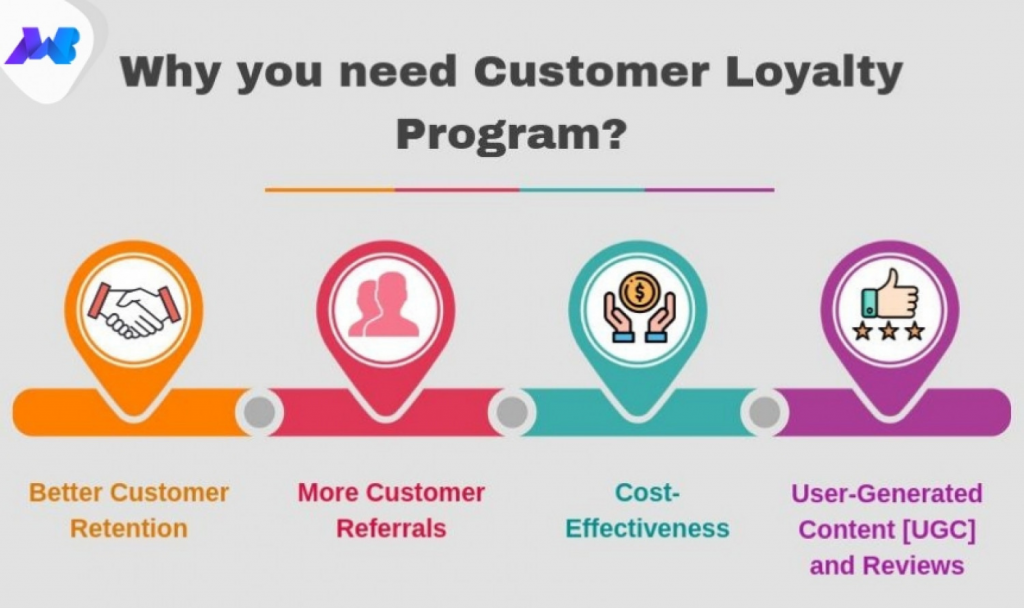
But how do you implement customer loyalty programs? By rewarding customers with incentives or benefits for their repeat purchases or brand loyalty using the best loyalty plugin.
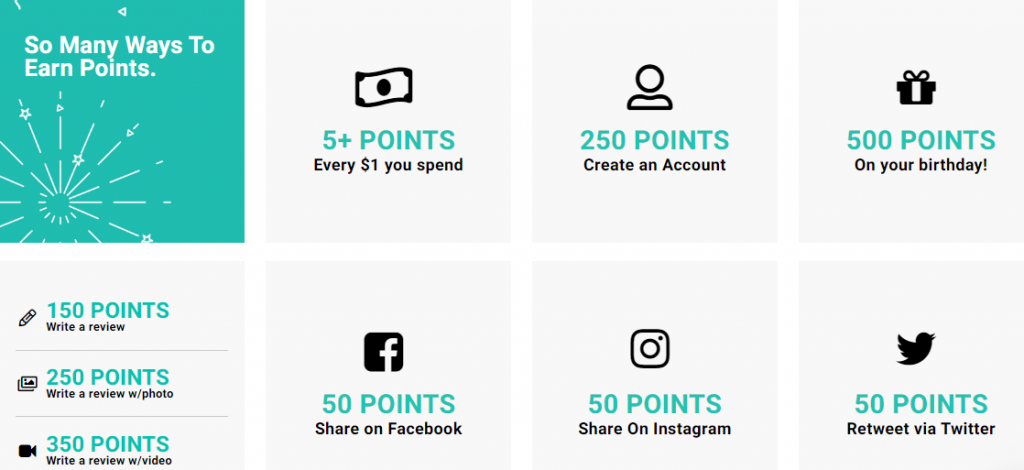
The benefits of customer loyalty programs include increased customer retention, higher customer lifetime value, and improved brand loyalty.
Provide Next order coupons
Providing Next-order coupons is a great customer engagement strategy.
If you want to drive repeated purchases, Next-order coupons are the way. It is an incentive that businesses offer to customers, providing a discount or other benefits on their next purchase. Data show that over 145.3 million users used coupon codes for shopping in the US, an increase of 21.29%.
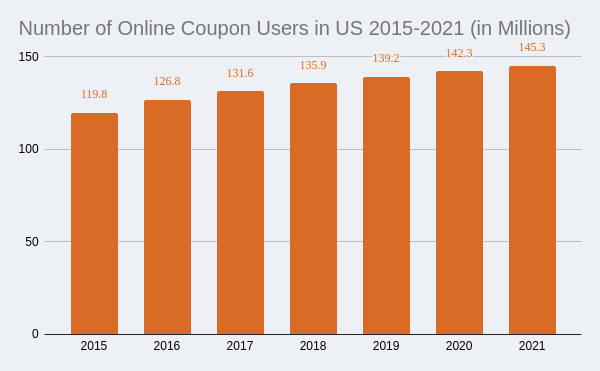
By providing Next order coupons to customers who make repeated purchases, you not only encourage them to return but also entice them to try out new products or services from your shop. Plus, if they’re happy with their purchase, they’re more likely to leave a positive review or recommend your shop to their friends and family, boosting your engagement and sales.
Follow up with customers
Follow-ups with customers are a vital component of your customer engagement strategy. There are several follow-up customer engagement methods, including follow-up emails, phone calls, social media, and chatbots. Find out which platform your target demographic is more likely to use and reach out to them using that method.
Here is a follow-up customer engagement example, you could send a personalized follow-up email thanking them for their recent purchase and offering a discount on their next purchase. Not only does this show that you value their opinion, but it also provides you with valuable insights into what you’re doing well and what you can improve.
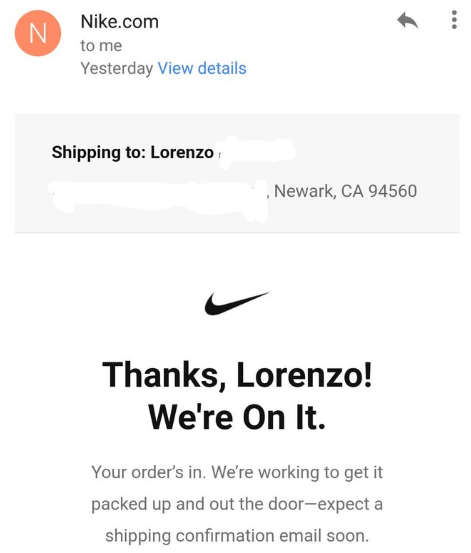
Mapping customer journey
Do you want your customers to keep coming back to your eCommerce store? Then you need to know the customer journey and how it helps your customer engagement strategy.
When businesses map the customer journey, they can see where customers might have problems or be unhappy. This helps businesses fix these issues which ultimately helps in better engagement and improves sales.
This can also help post-purchase upselling and cross-selling, thus increasing your store revenue. And beyond that, mapping customer journey helps to identify new opportunities and areas for development.
Start retaining your customers today! Sign up for Retainful and see your engagement levels grow.
Offer personalized service
Offering personalized service is a key component of successful customer engagement methods and is essential for any customer engagement strategy in eCommerce. Personalized service means treating each customer individually and tailoring your approach to their specific needs and preferences. It is a strategy that involves creating an emotional connection between customers and your brand by tailoring your services to meet their specific needs.
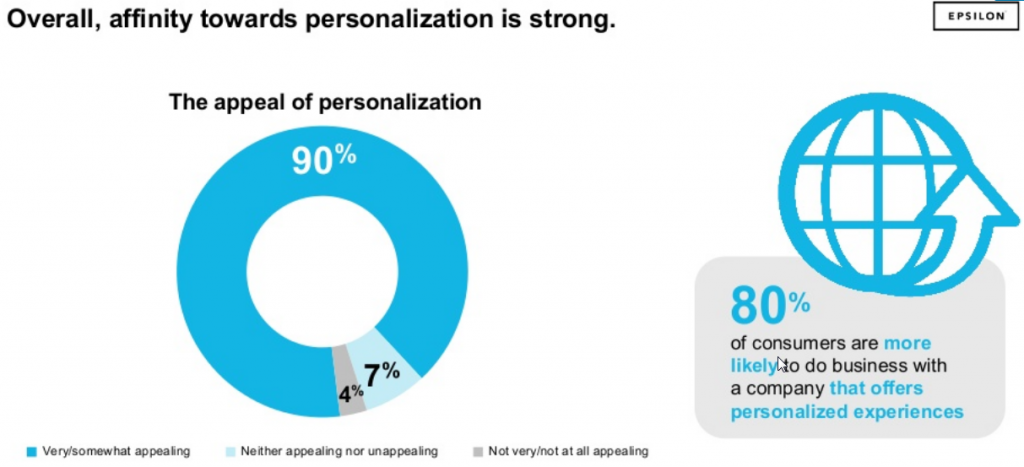
Here is a customer engagement strategy example, you might offer personalized product recommendations based on a customer’s browsing history or previous purchases or send targeted marketing emails that address specific customer interests.
You can also engage your customers by sending your personalized content through Facebook if they already follow your Facebook business page. Almost everyone is present on Facebook, so find your customer and persuade them with personalized content.
By offering personalized service to customers in eCommerce you can boost customer engagement by making customers feel valued and understood.
Create a referral program
Referral programs are an important customer engagement strategy because they tap into the power of word-of-mouth marketing. Have you ever considered creating a referral program for your shop? Referral programs encourage your current customers to tell their friends and family about your store. This helps you keep your current customers interested and get new ones too.
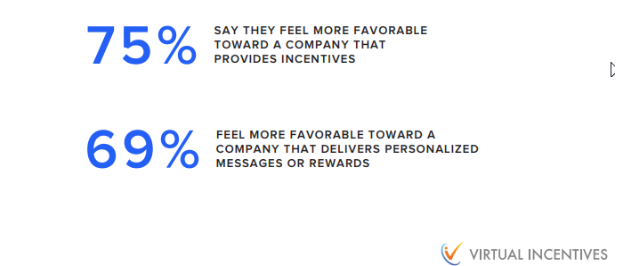
Now, the question is, what can you offer to your customers to motivate them to refer others to your shop? How about incentives like free shipping, discounts, free products, or store credit? That sounds pretty exciting, doesn’t it? You can run a successful referral program using the best referral apps available.
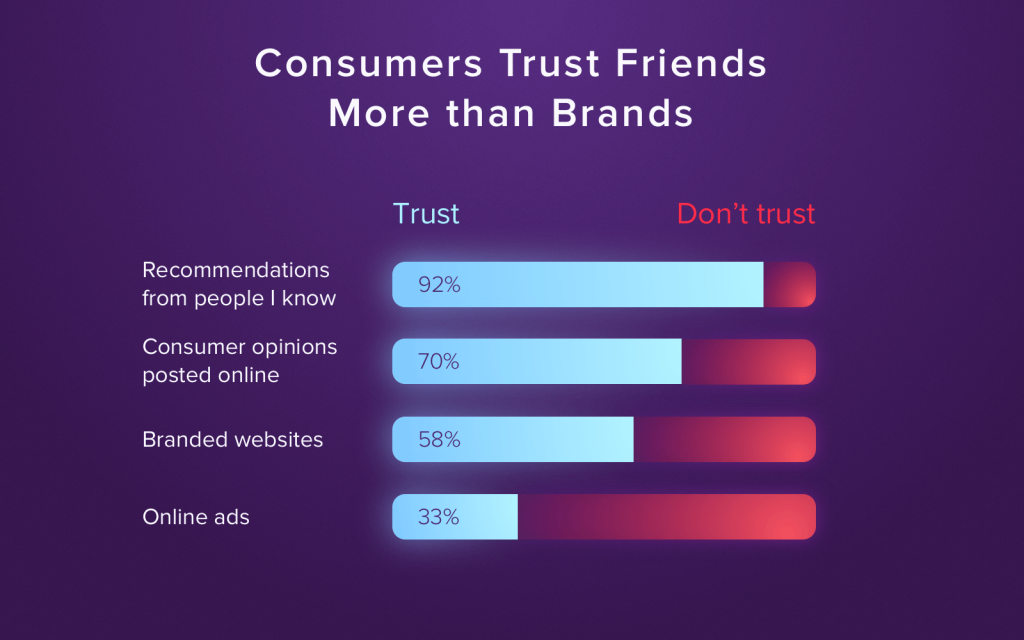
By offering such rewards, you can encourage your customers to spread the word about your shop and bring in more business and create a sense of community around your brand. By doing this, you not only increase your customer base but also strengthen your relationship with your current customers.
What if the customer doesn’t refer to their friends?
In these cases, you can run a referral program and reward your customers for every successful referral they bring to our store.
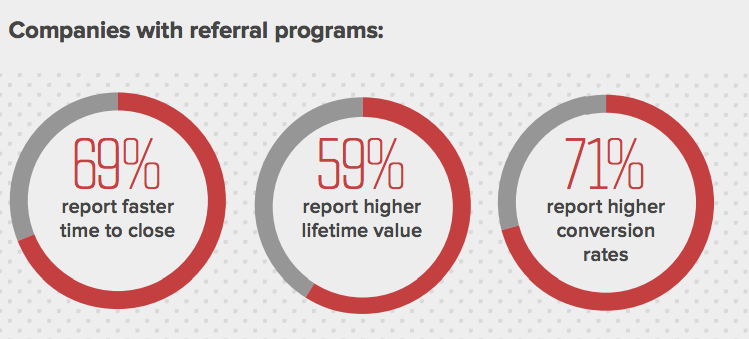
Shout out your reviews
One of the best ways to connect with your customers and keep them engaged is by encouraging customers to leave reviews of your products and services. By listening to the voice of the customer and letting them share their experiences, you’ll create a sense of community and build trust with your audience. Reviews also provide valuable feedback that you can use to improve your offerings and customer engagement methods.
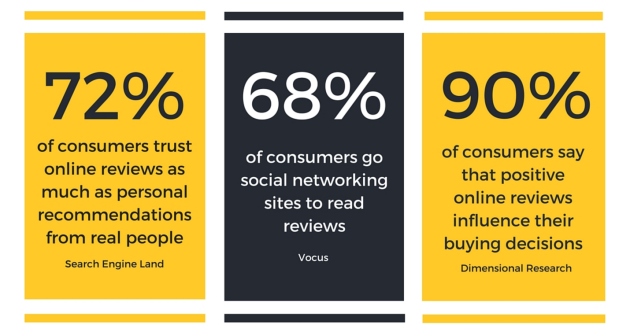
So what is the use of these reviews? When potential customers see positive reviews, it can be a powerful motivator to purchase. This is more like the saying that happy customers are the best advertisement.
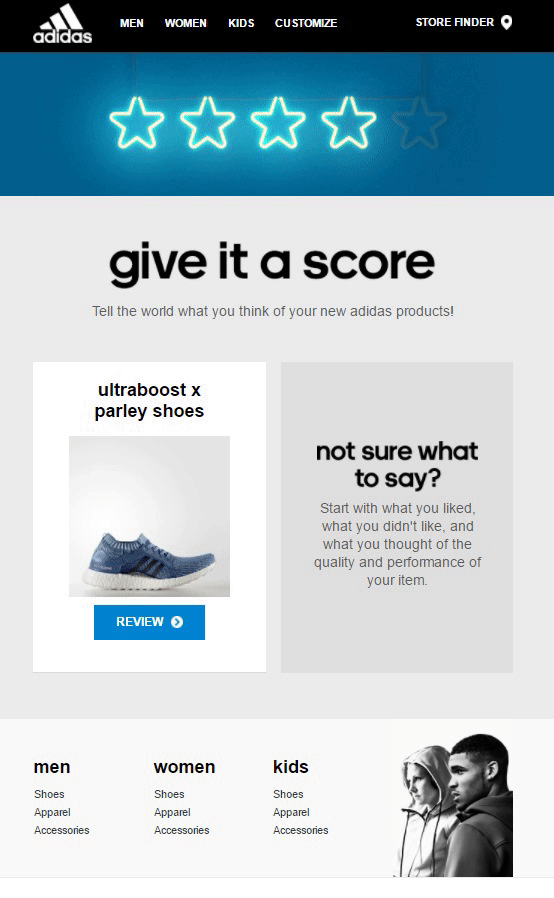
In fact, studies show that 91% of consumers read online reviews before making a buying decision.
Provide live chat
One of the best customer engagement methods available is providing live chat. This customer engagement strategy allows customers to get immediate help and answers to their questions, which can boost customer engagement and satisfaction. A study by Crazy Egg states 38% of customers are more likely to buy from companies with live chat support, and 63% of customers return to websites offering live chat because of its less response time.
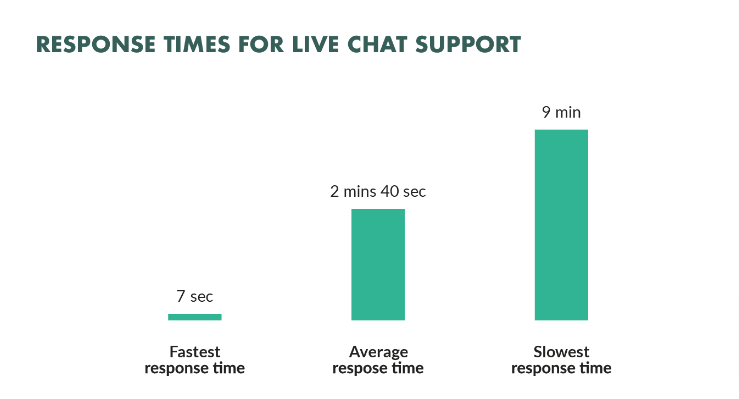
Imagine being able to chat with a real person while browsing a website and getting all your questions answered in real-time! How cool is that? Live chat also lets you personalize your customer service, making your customers feel valued and appreciated. So, if you want to boost customer engagement and improve your customer service, consider adding live chat to your eCommerce website.
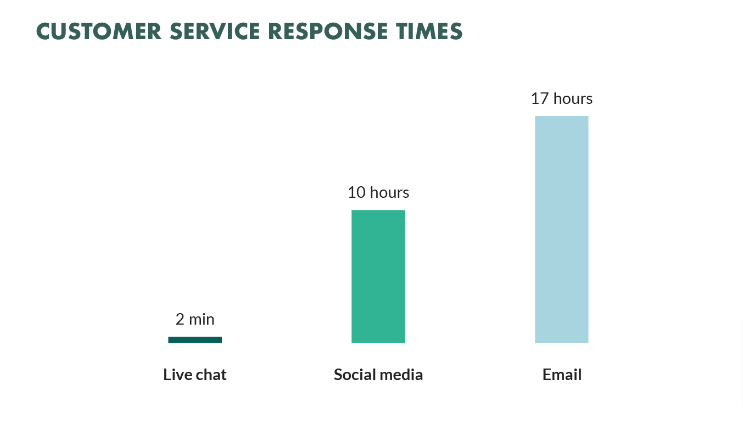
Don’t let your customers slip away! Use Retainful to keep your customers engaged and connected with your brand
Conclusion
In conclusion, engaging with customers post-sales is crucial for building strong and long-lasting relationships. Sending personalized thank-you notes, following up with customers to gather feedback, offering resources and tips, offering loyalty rewards, and staying in touch via email, social media, and chatbots are all proven methods for post-sales engagement.
Building long-lasting relationships with customers is important in today’s competitive eCommerce market. Engaging with customers post-sale helps to create a positive customer experience. It also encourages repeat purchases and generates new leads through positive word-of-mouth.
Some of the benefits of customer engagement post-sales include building customer loyalty, boosting sales, providing insights for improvement, increasing brand awareness, reducing customer retention, and offering opportunities for upselling.
One way to measure success in customer engagement post-sales in eCommerce is to track customer satisfaction through surveys, ratings, and reviews. Another way is to monitor customer retention and repeat purchase rates, as well as the number of referrals and recommendations they make.
To personalize customer engagement for ecommerce, you can use data such as browsing behavior, purchase history, and demographics to create targeted marketing campaigns and personalized product recommendations. Additionally, you can provide personalized customer service through chatbots, email marketing, and personalized messaging.
Customer engagement helps to build long-term relationships in eCommerce by fostering trust and loyalty through personalized interactions, providing exceptional customer service, and creating a positive customer experience that leads to repeat purchases and positive referrals. By focusing on building a relationship with the customer, eCommerce businesses can increase customer lifetime value and achieve sustainable growth.
Customer engagement post-sales is important in eCommerce because it helps to build long-term relationships with customers, increases customer retention, and leads to positive referrals. It also provides an opportunity to gather feedback, address concerns, and provide exceptional customer service, which can lead to increased customer satisfaction and loyalty.
Common mistakes to avoid in customer engagement include not listening to the customer, being too pushy or sales-oriented, failing to follow through on promises or commitments, and not providing a personalized experience. It’s important to prioritize the customer’s needs, communicate clearly and honestly, and strive to create a positive and memorable customer experience.
